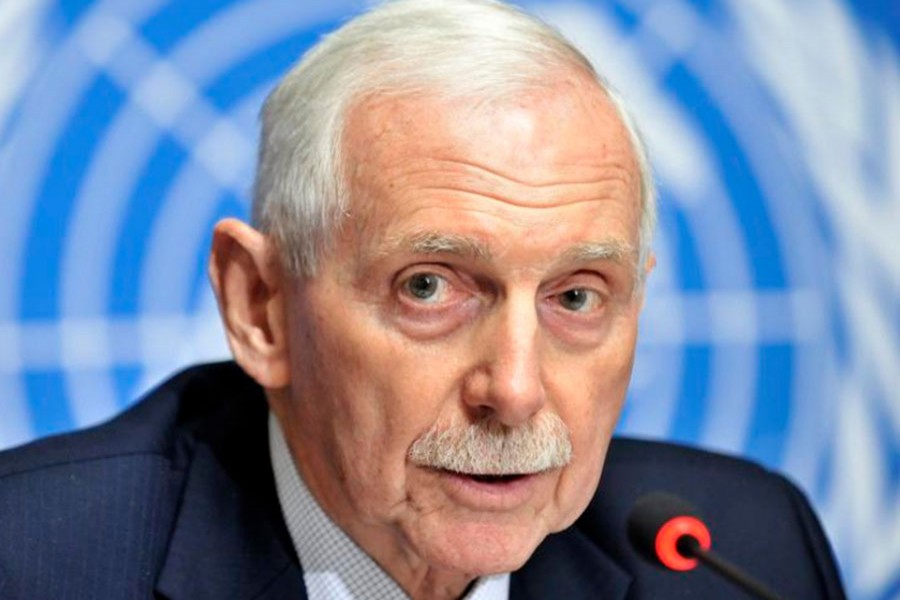International Organisation for Migration (IOM) Director General William Lacy Swing has said there can be no lasting peace in Rakhine State of Myanmar without inclusive development, report agencies.
"IOM, together with our UN partners, supports the recommendations of the Advisory Commission on Rakhine State established by Myanmar's Office of the State Counsellor and the Kofi Annan Foundation," he said.
Meanwhile, in an apparent rebuke to fresh accusations of arson by the army the office of Myanmar's commander-in-chief said Thursday Rohingya militants have set fire to houses in Rakhine state in recent days to intensify the exodus of the Muslim minority.
The IOM DG said they see this as a 'roadmap to peaceful co-existence' in Rakhine and welcome the Myanmar government's commitment to implement the Commission's findings.
"The first step, in that implementation process, will be to urgently allow UN agencies to resume their work in Rakhine State," he wrote in his recent article titled 'Why We Must Intervene to End the Suffering of Rohingyas in Cox's Bazar'.
But the most urgent need is now in Cox's Bazar on the other side of the border, said Swing.
"Unless we support the efforts of the Bangladesh government to provide immediate aid to the half million people who have arrived over the past month, many of the most vulnerable -- women, children and the elderly -- will die. They'll be the victims of neglect," he said.
Bangladesh, IOM and its partners are now struggling to provide adequate shelter, food, clean water, healthcare and protection to hundreds of thousands camped out over the vast muddy sites that now dot Cox's Bazar.
Five weeks on from the start of the crisis, funding has started to arrive, but much more will be needed.
Swing said if IOM's appeal to the international community for US$ 120 million does not meet its target, prospects for the refugees are dismal. "The money is desperately needed for shelter and non-food relief items, site development, site management; water and sanitation, health, protection, coordination, and communication and feedback in the settlements."
Without it, families will continue to suffer in the open or under inadequate plastic sheeting under daily, heavy rain, he said.
The lack of clean water and sanitation, which has already led to contamination of water sources, will lead to outbreaks of waterborne diseases, including cholera.
"Women who have suffered violent sexual assault will not get the vital care that they need, and often lifesaving. And a lack of protection will make the refugees -- particularly women and children -- targets for human traffickers," Swing said.
IOM, the UN Migration Agency, which he leads, coordinates the work of humanitarian agencies in Cox's Bazar on behalf of the Bangladesh government.
He said the world has reacted with horror to the images of their flight, and the stories of murder, rape and arson brought from their still smoldering villages in North Rakhine State.
Report from Yangon adds: A post on the Facebook page of the office of army chief Min Aung Hlaing said blazes at seven houses in a Rohingya village early Wednesday were started by an "Einu" or a militant from the Arakan Rohingya Salvation Army (ARSA).
Security forces "working for the rule of law" in Mi Chaung Zay in Buthidaung township helped villagers extinguish the fires which "broke out about 2:40am on October 4th", the post said.
Accusing "ARSA extremist terrorist" Einu, the statement said he had been "urging people to run" from Rohingya villages to Bangladesh.
The refugee crisis erupted after ARSA raids on Myanmar police posts on August 25.
Refugees who have made it to Bangladesh accuse Myanmar's army -- flanked by mobs of ethnic Rakhine -- of slaughtering them and burning their villages.
Rights groups say satellite data provides evidence of a systematic 'scorched earth' campaign targeting Rohingya villages -- an act the UN says is tantamount to "ethnic cleansing".
But Myanmar's army has denied burning Rohingya villages and consistently accused militants of razing their own homes before fleeing to drum up global support for their cause.
The battery of competing claims is impossible to check independently because the conflict-wracked area of Rakhine is under an army lockdown.
Since the crisis began media and international NGOs have only been given highly controlled access on officially-steered visits.


